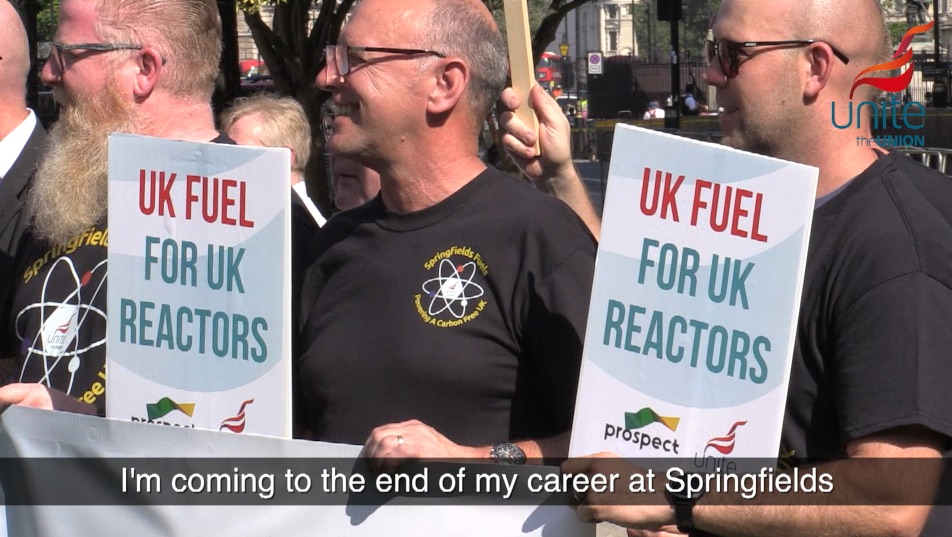Nuclear build delays?
The construction of Britain’s first nuclear power plant in a generation may see delays as it faces continued legal challenges from European critics, including the Austrian government and a co-operative of energy suppliers in Germany.
The construction of the Hinkley Point C plant – which will be a boon for the local and wider economy, while powering seven per cent of the UK’s electricity – was granted final permission by the European Commission (EC) in October of last year.
The EC’s approval, however, followed a lengthy inquiry into state aid, which involves the UK government guaranteeing a minimum price for the electricity bought from the new reactor for a period of 35 years.
But critics contend that this guarantee unfairly distorts the market and disrupts the free flow of capital in the EU.
Now, energy and business minister Matthew Hancock revealed yesterday (March 5) that the government is requesting a “golden share”, which would give the government special voting rights and a decided control in the plant’s future.
The Independent reported that the golden share request could lead to even more delays, further fuelling critics’ legal challenge.
But Unite national officer for energy and utilities Kevin Coyne argues that the golden share request can only be seen as a good thing.
“We are of the view that all utilities should be publically owned, so anything that moves towards a publically funded system, we would support,” he said.
Best energy solution
Even in the face of legal challenges, Coyne defended the UK’s nuclear investment programme, which he says will provide a reliable and environmentally friendly long-term solution to the nation’s energy security.
“Nuclear is zero-carbon and is a huge generator of electricity for the UK,” he said. “The building of Hinkley Point would put on another 20 gigawatts to the supply and it would do it without carbon emissions. Therefore in all ways it is environmentally friendly.”
“We’ve found that even people from the environmental lobbies are coming around to our view that nuclear is probably the best solution,” he added.
“Wind power cannot compete, in the sense that the wind doesn’t blow when it’s not cold and you can’t store electricity.
Secondly, coal, in its unabated form will be outlawed by 2025. Without the massive investment in carbon capture and storage, coal will go out of production, which means that 25 per cent of our electricity goes out of production overnight.”
Coyne explained, then, that investment in nuclear is integral to a balanced energy policy in the UK.
“Coal and nuclear together provide well over half of the UK’s electricity,” he said. “And so if you don’t have new power stations, how are you going to replace that? The only other source is gas, but gas is a carbon emission.”
Best agreements ever negotiated
Hinkley is the site of two other nuclear power stations, with one currently being decommissioned. It’s this background that Coyne says makes the construction of a new plant in the area vital.
“There’s a large workforce that’s based there that’s eminently qualified in terms of skills,” he said. “The population know how to operate and run power stations. So the new plant would provide continuity in the area for the next 60 years – and that’s just in terms of its operation.
The construction of the plant alone, however, will be a wellspring of jobs for the local economy.
“The construction of the plant is based upon 5,000 jobs at any one time, with 22,000 over its six-year lifespan,” Coyne said.
The most exciting prospect of Hinkley’s construction and the jobs it will generate is that these jobs have been negotiated by Unite and other unions under what Coyne calls “some of the best agreements we’ve ever had.”
“They provide for a huge quality of pay,” he explained. “The terms and conditions are good, and trade unions are absolutely central to them. There’s a clause of no blacklisting and specific methods which ensure that it doesn’t happen – this is very important to us. There’s a pension scheme which traditionally you don’t have in construction.”
“And those are just snapshots,” he added. “There’s so much in the agreements that are very impressive.”
The cost of cleaning up
If the eventual construction of the Hinkley Point C nuclear plant may herald a nuclear renaissance, nuclear clean up and decommissioning of existing sites remains a dilemma.
Yesterday (March 5), the National Audit Office noted in a report that the estimated cost of decommissioning and cleaning up Britain’s most hazardous and complex nuclear plant, Sellafield, will rise by £5bn in a year – bringing the total cost to £53bn.
Although Coyne asserts that nuclear clean-up is an inherently expensive endeavour, exorbitant costs can also be attributed to private outsourcing.
At Sellafield, a private consortium contracted for 17 years to undertake the clean-up and decommissioning process was sacked earlier this year after reckless mismanagement. Parts of the project will now be essentially renationalised.
“The consortium contracted for the project employed all sorts of mechanisms which ended up being prohibitively costly,” he explained.
Coyne pointed to Cavendish Fluor, an American-based company contracted to decontaminate 12 other nuclear sites, as another prime example. Last month, just six months after winning the contract, it has now requested millions of dollars in additional taxpayer money.
“Our biggest concern about all these private companies is that when they first estimate costs, they often discover something or the other at a later stage that they hadn’t accounted for – and so they subsequently charge more,” he said.
“With a public contract, on the other hand, you’re paying the workers, as it were, and you do whatever there is to do,” Coyne added. “It’s much more cost-effective.”
Indeed, as the Sellafield contract is cancelled not long after the Circle and Atos contract disasters in two completely separate arenas of public provision, a clear pattern emerges. Whether it’s health, welfare or nuclear clean-up, privatisation simply doesn’t pay.
 Like
Like Follow
Follow

